The Benefits of Addressing Family Dynamics in Therapy

Understanding the Influence of Family Dynamics
Family dynamics encompass the intricate web of interactions, roles, and relationships within a family unit. These dynamics significantly impact individual development and overall well-being. By addressing the patterns and roles within families, therapy can enhance communication, build resilience, and foster healthier relationships, benefitting all members.
Why Family Dynamics Matter in Therapy
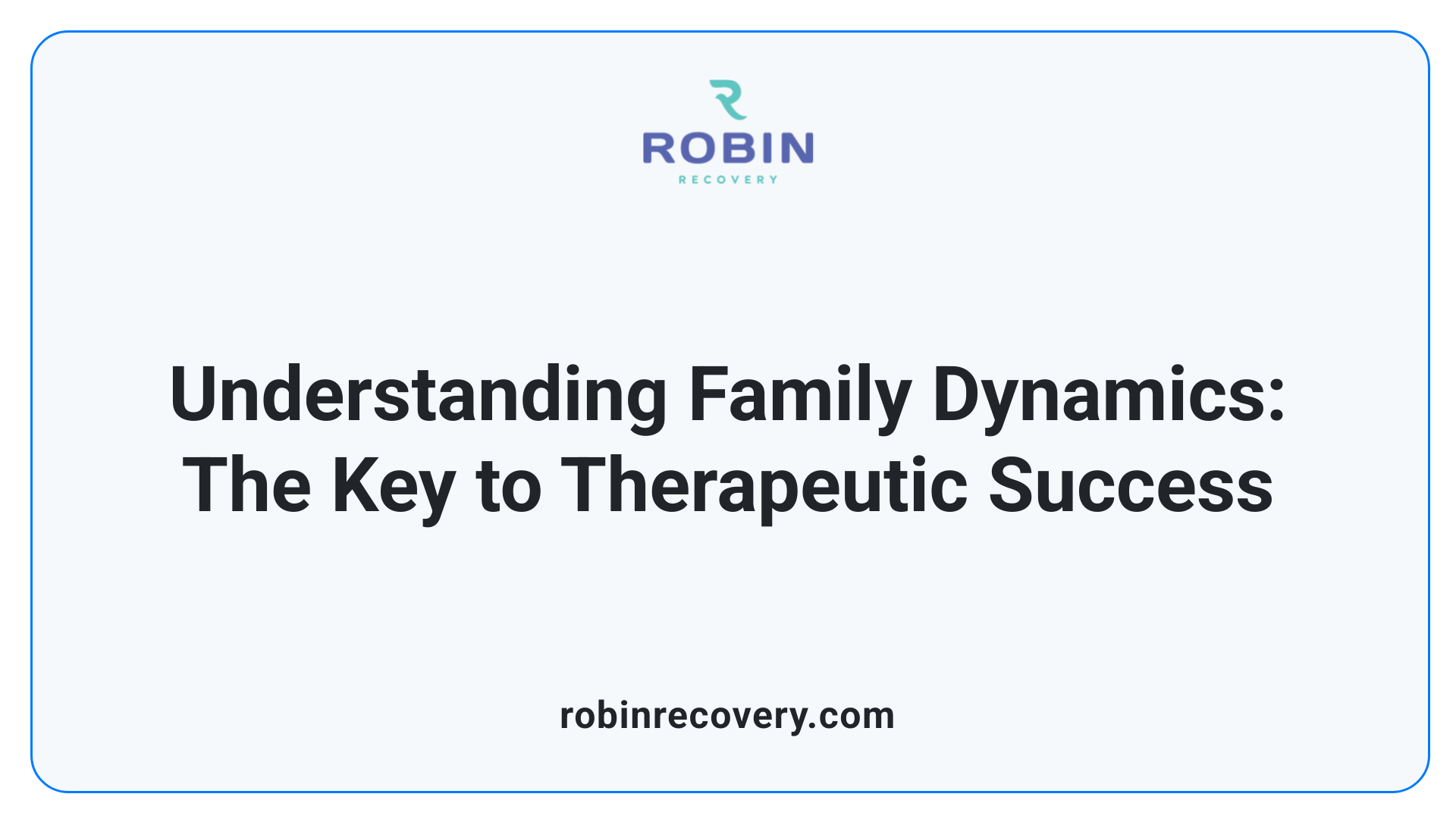
Why are family dynamics important?
Family dynamics play a crucial role in shaping individual development and mental health outcomes. They refer to the patterns of interactions and relationships among family members, which can significantly affect emotional and psychological well-being. For instance, a nurturing family environment characterized by open communication and mutual support can enhance resilience and positive emotional growth.
In contrast, dysfunctional family dynamics—such as authoritarian parenting styles or poor conflict resolution—often lead to heightened stress and emotional distress. Families that struggle with communication or harbor judgmental attitudes may find themselves cycling through misunderstandings, ultimately damaging relationships and impacting mental health for all members involved.
Recognizing healthy versus dysfunctional family characteristics is essential. Healthy families typically exhibit:
- Open Communication: Encouraging expressions of thoughts and feelings.
- Emotional Support: Providing a backing that fosters security and empathy.
- Conflict Resolution: Engaging in constructive disagreements and finding solutions collaboratively.
Conversely, dysfunctional families may demonstrate:
- Poor Communication: Leading to misunderstandings and unresolved issues.
- Judgmental Attitudes: Creating an unwelcoming environment that stifles honest dialogue.
- Rigid Roles: Limiting individual growth and self-expression.
Understanding family dynamics allows therapists to identify the root causes of conflicts, providing a platform to facilitate healthier interactions among members. This knowledge ultimately promotes better mental health and enhances the overall family experience.
Key Benefits of Family Therapy
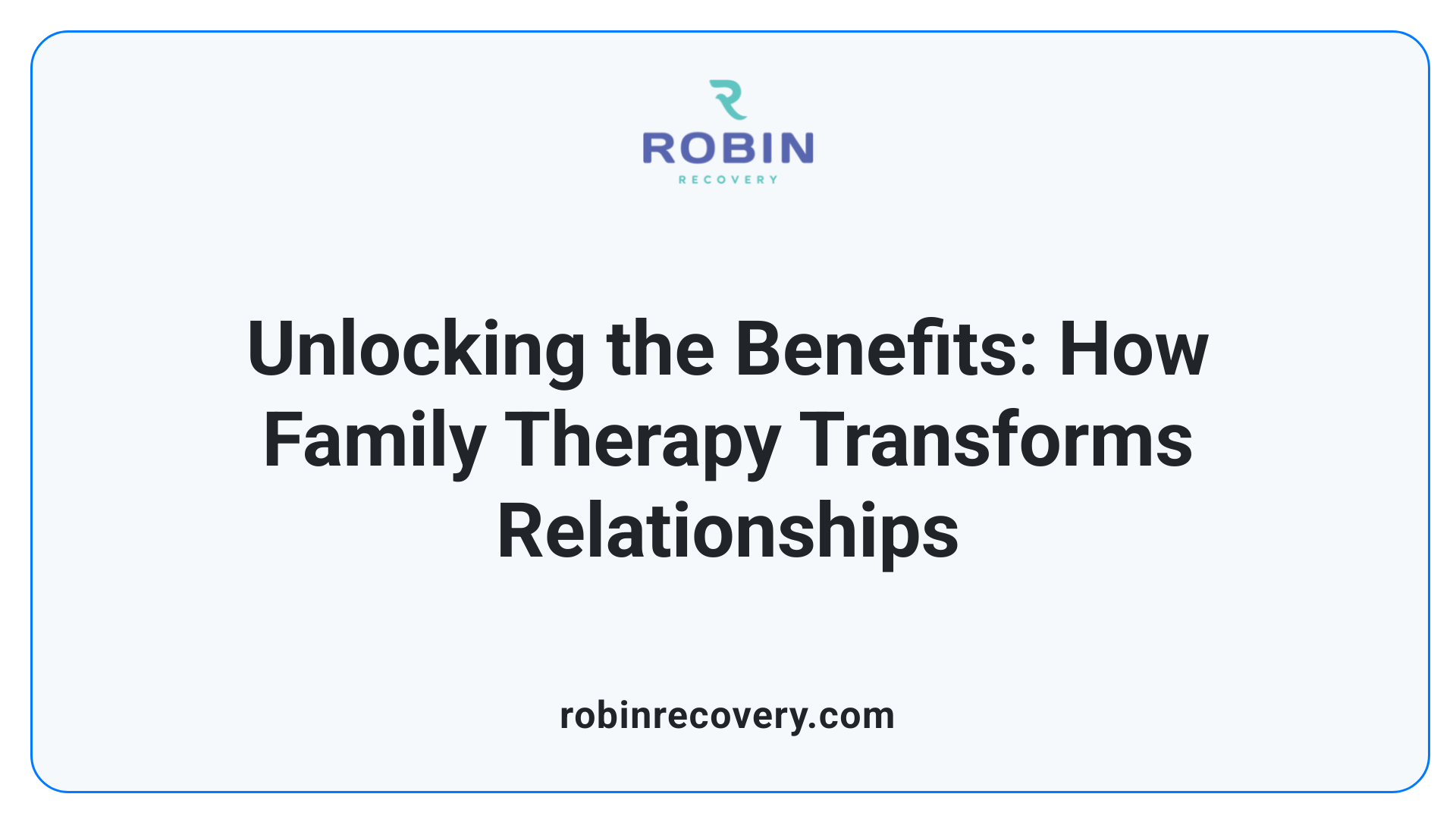
What are some key benefits of family therapy?
Family therapy offers several key benefits that can enhance family dynamics and individual well-being. One of the primary advantages is improved communication among family members. Effective therapy sessions help families express their thoughts and feelings more clearly, reducing misunderstandings and fostering stronger relationships.
Moreover, family therapy teaches valuable conflict resolution strategies. By addressing dysfunctional roles and patterns, family members learn to manage disputes constructively, promoting a healthier family environment. This approach enables families to collaborate in identifying problems, brainstorming solutions, and implementing strategies collectively.
Another significant benefit is the support provided during crises and transitions. Therapy assists families in navigating challenges such as divorce, loss, and illness, fostering resilience during difficult times. As families learn to redefine relationships and develop healthy boundaries, they can better support one another through life changes.
In terms of promoting physical and psychological health, family therapy plays a crucial role. Addressing individual mental health issues within a family context ultimately improves overall family dynamics. The emotional support cultivated during therapy strengthens familial bonds, leading to improved resilience, understanding, and empathy across family members, which is essential for individual and collective well-being.
Exploring the Advantages and Drawbacks of Family Therapy
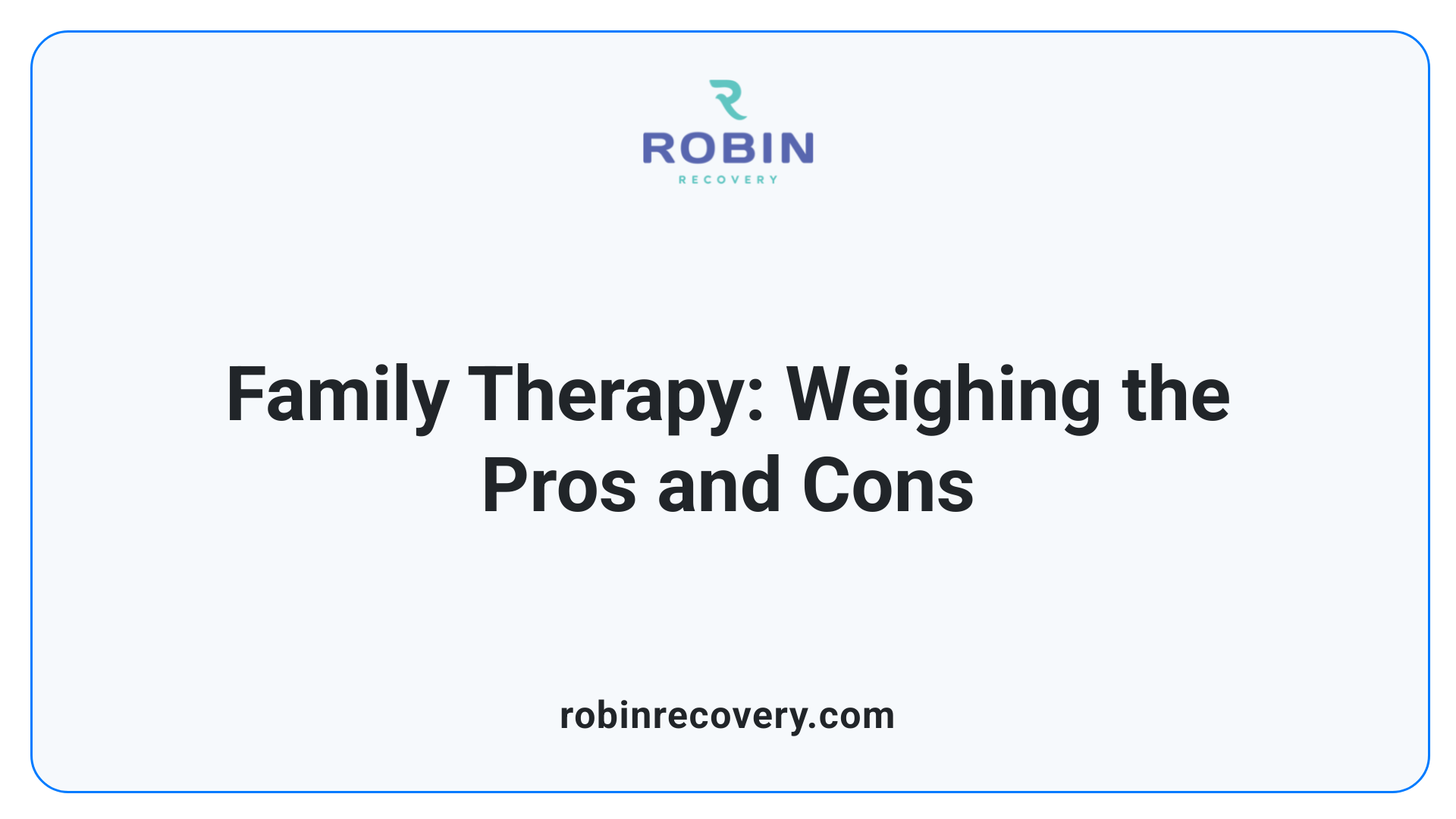
What are the advantages and disadvantages of family therapy?
Family therapy offers numerous benefits that can significantly enhance family dynamics. One of the most notable advantages is improved communication. By providing a safe space for family members to express their thoughts and feelings, therapy fosters open dialogue and helps reduce misunderstandings.
Another advantage is the development of conflict resolution skills. Therapy introduces effective strategies that families can apply during disputes, promoting healthier ways to navigate conflicts. This can lead to stronger emotional bonds as empathy and understanding are cultivated among family members.
Moreover, family therapy operates on a holistic approach, recognizing the interconnectedness of individual behaviors within the family system. This perspective not only addresses psychological issues but also enhances support systems, particularly benefiting children's mental health.
However, there are potential limitations to family therapy. Participation requires significant time and financial commitments, which can act as barriers for some families. Resistance from individual members may also occur, leading to emotional discomfort during challenging discussions.
Privacy concerns and power imbalances within family dynamics can hinder effective participation. The overall success of family therapy often hinges on the willingness and engagement of all family members involved, making it essential for everyone to be committed to the therapeutic process.
How Family Therapy Alters Family Roles and Dynamics
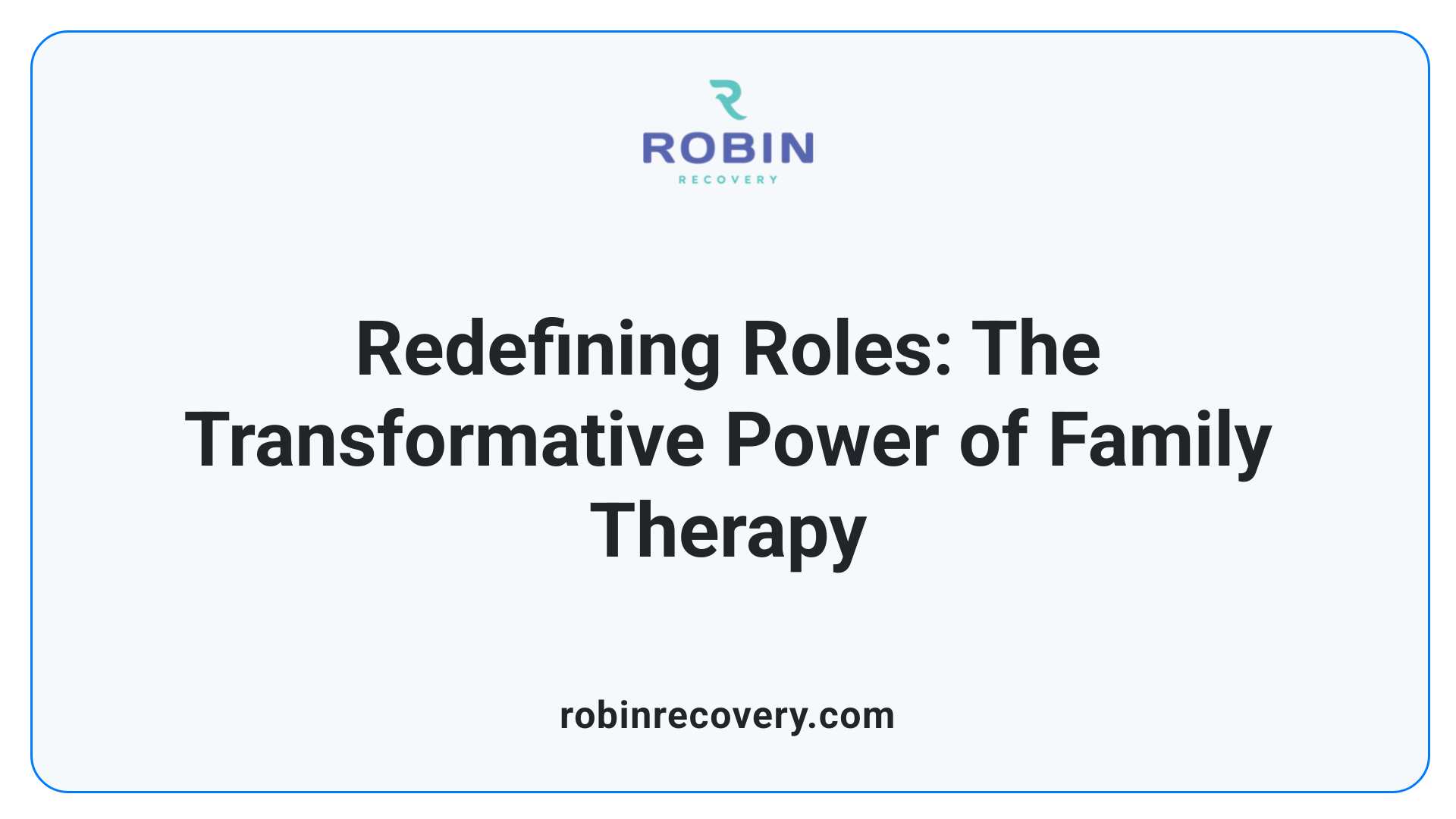
Improving communication and empathy
Family therapy plays a crucial role in reshaping the dynamics within a family by prioritizing open communication and emotional understanding. Therapists work with family members to express their thoughts and feelings more effectively, enhancing empathy amongst them. By utilizing techniques like active listening and role-playing, families learn to articulate their concerns while also considering different perspectives. This process reduces misunderstandings that can lead to conflicts and promotes a safe environment for all voices to be heard.
Family systems theory and resolving conflicts
One significant aspect of family therapy is its foundation in family systems theory, established by Dr. Murray Bowen. This theory highlights the interconnectedness of family members and how changes in one individual's behavior can influence the entire group. Therapy sessions focus on uncovering dysfunctional roles and patterns that underlie the family’s interactions. By exploring these dynamics, therapists help families introduce constructive conflict resolution strategies, enhancing their ability to navigate future disputes collaboratively.
Ultimately, family therapy aims to reshape these internal dynamics for healthier relationships, equipping families with the tools to support each other through complex challenges. Through increased self-awareness and understanding of family roles, members can strengthen their bonds and improve overall emotional health.
Addressing Family Resistance in Therapy
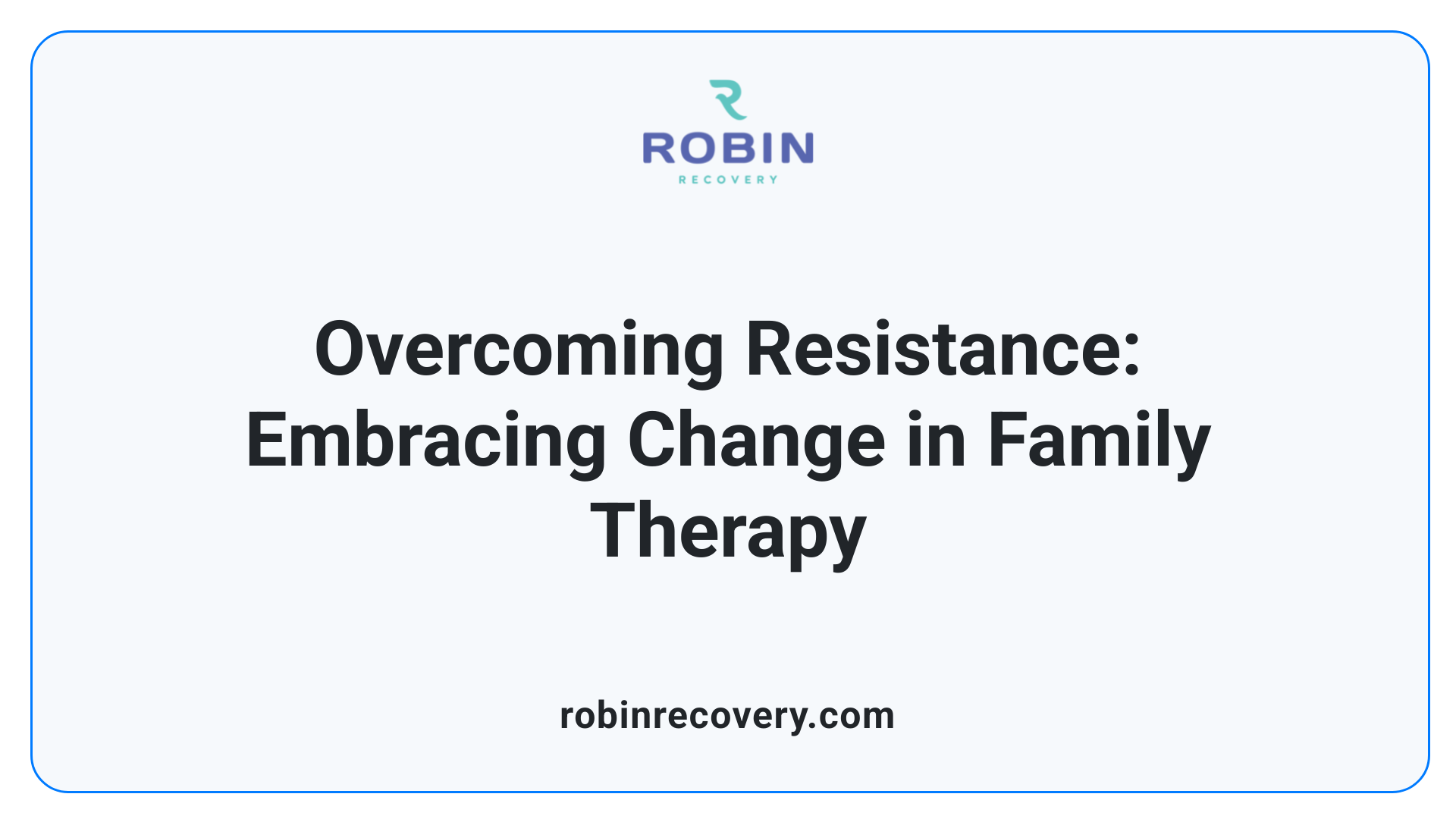
Why is it important to address resistance in family therapy?
Addressing resistance in family therapy is essential because it can greatly impact the effectiveness of treatment. Resistance often arises from a variety of fears and concerns including:
- Fear of confrontation: Family members may be apprehensive about discussing difficult or painful issues.
- Concerns about privacy: Individuals might worry about how information shared in therapy could affect future interactions.
- Lack of understanding: Some may not fully grasp the purpose of therapy and how it can benefit family dynamics.
Recognizing these factors is vital for fostering an environment where all family members feel safe and supported.
Strategies for engaging reluctant family members
To help engage resistant individuals, therapists can implement several effective strategies:
- Normalize participation: Highlight that therapy is a common practice for improving relationships.
- Encourage open dialogue: Facilitate discussions about fears and expectations around therapy to build trust.
- Involve family members in goal setting: Collaboratively defining objectives can increase investment in the process.
- Use family-specific techniques: Tailoring approaches to meet the unique dynamics of the family can promote engagement.
Overcoming challenges in therapy participation
Overcoming participation challenges often involves:
- Active listening: Ensuring that all voices are heard fosters a sense of belonging and encourages participation.
- Flexibility in scheduling: Adapting session times to accommodate family members' commitments can improve attendance.
- Creating a safe environment: Establishing a judgment-free zone allows for honest expression.
By addressing these aspects effectively, families can be guided towards enhancing their relational dynamics and achieving therapeutic goals.
Enhancing Communication and Conflict Resolution
Developing effective communication skills
Family therapy plays a crucial role in developing effective communication skills among family members. Therapeutic environments encourage families to openly express their thoughts and feelings, fostering a culture of active listening. Techniques such as active listening and asking open-ended questions enhance dialogue, allowing each member’s perspective to be validated.
Moreover, families learn to articulate their needs and emotions more clearly. This communication training helps reduce misunderstandings, with deeper empathy emerging as members practice seeing situations from each other's viewpoints. Such improvements in communication lead to stronger emotional bonds and a more supportive home environment.
Conflict resolution techniques in family therapy
Family therapy also emphasizes healthy conflict resolution techniques. Therapists guide families in identifying dysfunctional patterns and dysfunctional roles that contribute to disputes. Empowering family members with strategies to address conflicts constructively, such as negotiating solutions and employing cooperative problem-solving, is essential.
Additionally, therapy sessions facilitate discussions on regulating emotions during disagreements, enabling families to navigate conflicts without harmful escalation. This approach not only resolves immediate issues but also enhances the overall family dynamic, leading to resilience in facing future challenges together. Through these processes, families cultivate healthier ways to interact and foster a long-lasting atmosphere of understanding.
The Role of Family Dynamics in Child Therapy
Influence of family environment on child development
The family environment is pivotal in shaping a child's emotional and psychological well-being. Positive family dynamics—characterized by warmth, support, and open communication—are protective factors that promote resilience in children. Conversely, negative dynamics increase the risk of emotional and behavioral issues, such as anxiety and conduct disorders. Factors such as effective communication, conflict resolution, and empathetic interactions within the family directly influence how children cope with challenges and stressors.
Moreover, parents play a crucial role in setting expectations and modeling behaviors that contribute to healthy emotional climate. Structured routines and clear boundaries within the family create a sense of security, making it easier for children to benefit from therapeutic efforts.
Importance of parental involvement in therapy
Active participation of parents in therapy significantly impacts the therapeutic outcomes for children. When parents engage in the therapeutic process, they not only understand their child's needs more deeply but also learn effective parenting strategies that foster healthier relationships. Open communication between parents and therapists is vital for adapting treatment to the child's evolving needs.
Family therapy allows parents to process their own emotions and concerns while collaboratively addressing family dynamics. This involvement cultivates an environment where children feel supported by both their parents and therapists, enhancing the overall effectiveness of therapeutic interventions and promoting long-term emotional health.
Family Therapy Techniques and Their Impact
Specific Therapeutic Methodologies
Family therapy incorporates various methodologies designed to support families through their unique challenges. Some common approaches include:
- Family Systems Therapy: This methodology views the family as an interconnected unit, focusing on how changes in one member affect the entire family.
- Behavioral Therapy: Emphasizes actions and consequences, helping families implement new behaviors to improve dynamics.
- Cognitive-Behavioral Therapy (CBT): Aims at modifying unhealthy thought processes that hinder family interactions, fostering better communication.
- Functional Family Therapy: Specifically addresses families with children exhibiting behavioral problems, promoting positive interactions.
- Transgenerational Therapy: Examines family interactions across generations to identify patterns impacting current dynamics.
Effectiveness in Various Family Scenarios
Family therapy has shown effectiveness across multiple situations, including:
Scenario Key Effectiveness Outcomes Addiction Treatment Improved trust Enhanced support systems Parenting Issues Better strategies Strengthened parent-child relationships Blended Families Navigated complexities Fostered harmony Mental Health Challenges Enhanced understanding Support for individual and family therapy Significant Life Transitions Better adaptation Resilient family dynamics
This multifaceted approach empowers families to develop coping strategies, improve communication, and strengthen emotional bonds, leading to healthier relationships overall.
Cross-Generational Influences in Family Therapy
Exploring interactions across generations
Transgenerational therapy focuses on how family dynamics and behavior patterns are passed down through generations. It examines the roles, beliefs, and conflicts established within families over time, highlighting how these elements impact current family interactions. The therapy empowers families to recognize these longstanding patterns and work towards breaking the cycle of dysfunction, encouraging healthier dynamics in the present.
Impact on current family issues
Understanding these historical influences allows families to address their ongoing conflicts more constructively. By recognizing the roots of their behaviors, families can work together to change negative patterns that have persisted across generations. For instance, a family's history of unresolved conflicts might manifest as current disputes among siblings, but with transgenerational therapy, they learn to communicate effectively to foster resilience and support.
Through this insightful approach, therapy sessions help families cultivate empathy by encouraging them to consider each other's perspectives and emotional backgrounds. By facilitating discussions around these generational influences, families can strengthen their relationships and improve their overall functioning, making transgenerational therapy a valuable tool for healing and growth.
Family Therapy in Addressing Major Life Changes
Assisting families through transitions
Family therapy plays a vital role in helping families navigate significant life changes such as divorce, loss, or remarriage. These transitions can be emotionally taxing, often leading to stress and conflict within the family unit. Therapists facilitate open discussions about these changes, creating a safe space for family members to express their feelings and concerns. This collaborative approach allows families to process these changes together, fostering understanding and strengthening emotional ties.
Strengthening resilience and adaptability
The therapy further equips families with strategies to enhance resilience, teaching them how to adapt to new circumstances effectively. By recognizing and addressing anxiety related to transitions, family therapy promotes coping skills that aid in managing stress. Families learn to support one another, which is crucial in building a sense of security amid uncertainty. Through enhanced communication and emotional support, family members can develop a united front, allowing them to emerge from life changes more cohesive and adaptable together.
Focus Area Benefits Key Strategies Navigating Life Changes Improved emotional expression Safe space for sharing feelings Building Resilience Enhanced coping mechanisms Stress management techniques Supporting Relationships Stronger familial bonds Collaborative discussions
Embracing the Potential of Family Therapy
By addressing family dynamics in therapy, families can unlock significant benefits that improve their interactions and relationships. From fostering open communication to resolving long-standing conflicts, family therapy provides essential tools and support. Emphasizing the interconnectedness of family members, it nurtures empathy, strengthens bonds, and enhances overall well-being, guiding families through life's challenges with resilience and unity.
References
- Healthy Family Dynamics- The Role of Therapy
- Understanding the Dynamics of Family Systems in Therapy
- The Impact of Family Dynamics on Child Therapy
- Benefits of Family Counseling and How It Works - MedicalNewsToday
- Family Dynamics - StatPearls - NCBI Bookshelf
- Unveiling the Benefits of Family Therapy
- The role of family therapy in improving family dynamics
- What are the goals of Family therapy? - Clearfork Academy
- How Therapy Can Improve Family Dynamics | Northpoint Colorado
- Family Systems Therapy: Definition and Efficacy - Verywell Mind
